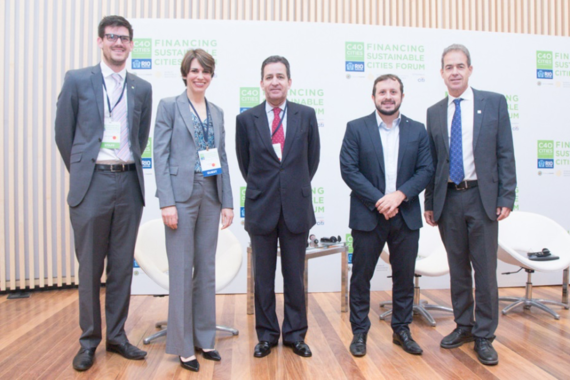By Mark Watts, Executive Director of C40, Ani Dasgupta, Global Director of WRI Ross Center for Sustainable Cities, and Brandee McHale, President of the Citi Foundation and Director of Corporate Citizenship at Citi
There's been much discussion about the historic adoption of the Sustainable Development Goals in September 2015, the Paris Agreement on climate change in December 2015, and the New Urban Agenda in Quito in October 2016. They share one thing in common: the key role of mayors in delivering the local action necessary to achieve ambitious global outcomes. Yet, as was highlighted by the Call for Action on Municipal Infrastructure Finance, launched by C40 Cities Climate Leadership Group (C40) with the supported by 28 organisations, mayors face many challenges in delivering sustainable urban development, particularly acute financing challenges. In an environment of constrained municipal budgets, we need to unlock additional funding and finance to deliver sustainable services to the growing urban population.
That's why C40, WRI Ross Center for Sustainable Cities, and the Citi Foundation have joined with over 65 cities for the C40 Mayors Summit in Mexico City to emphasize the critical role of finance in delivering a truly sustainable future. It is time to focus on how local and national governments, financial institutions, and the private sector can work together to mobilize the trillions of dollars of investment needed to turn ambition into action.

Representatives of Financing Sustainable Cities Initiative partners, from left: James Alexander, C40; Val Smith, Citi; Helio Lima Magalhães, Citi Brazil; Rodrigo Rosa, C40 and City of Rio de Janeiro; and Toni Lindau, WRI Brasil Sustainable Cities.
The emerging discourse on sustainable urban finance hinges on four key questions: what to invest in, how to pay for it, how to mobilize investment capital, and how to structure contracts and institutional frameworks. To best answer these questions, we must continue building a shared understanding of the challenges and opportunities for unlocking funding, financing, and the delivery mechanisms for sustainable investments in cities.
The Financing Sustainable Cities Initiative (FSCI) is helping to do just that.
A joint effort from C40, WRI Ross Center for Sustainable Cities, and the Citi Foundation, the FSCI is helping accelerate and scale up investment in sustainable urban solutions. By identifying the ingredients of successful sustainable urban projects around the world, this groundbreaking partnership is helping city governments and investors develop business models that enable all stakeholders to bridge quickly from innovation to implementation and help cities to reach their full potential. It's not just about finding more money; investors and city decision-makers need new ways of seeing eye-to-eye on what makes urban investment a sustainable and a financially viable solution.
Over the last 12 months, the FSCI has held a series of technical workshops and a Financing Sustainable Cities Forum, collectively convening more than 300 senior officials and technical staff from government, financial institutions, and the private sector to collaborate on business models for sustainable urban solutions.
Our most recent workshop in South Africa brought together city government urban planners, transport officials, economists, and Chief Financial Officers who each play an instrumental role in determining the development path of their cities. This was the first time these key players in South Africa's four largest cities had come together to collaborate with each other and external finance experts on creating transit-oriented cities and reducing urban sprawl.
In India and Brazil, we are working with public and private actors to explore how to adapt global business models for transit-oriented development to their national context. The transformative potential of capacity development and informed dialogue is becoming particularly powerful in Cali, Colombia, where a coalition is emerging for Colombia's first investment specifically focused on transit-oriented development.
Over the next 18 months, we will continue to work closely with cities across the globe and will be sharing the results through a series of events, publications and an online platform. This platform will make our findings on business models for sustainable solutions freely available to cities, investors, solution providers, and partner organizations. In doing so, we aim to support the growing ecosystem of people working to implement the New Urban Agenda, Sustainable Development Goals, and the Paris Agreement to create more prosperous, inclusive, and sustainable cities.
This post is part of a series produced by The Huffington Post, in conjunction with the C40 Mayors Summit in Mexico City (Nov. 30-Dec. 2). Through the voices of the private sector, partners and mayors themselves, the series will put a spotlight on how mayors are collaborating and innovating to deliver climate action. To view the entire series, visit here.
